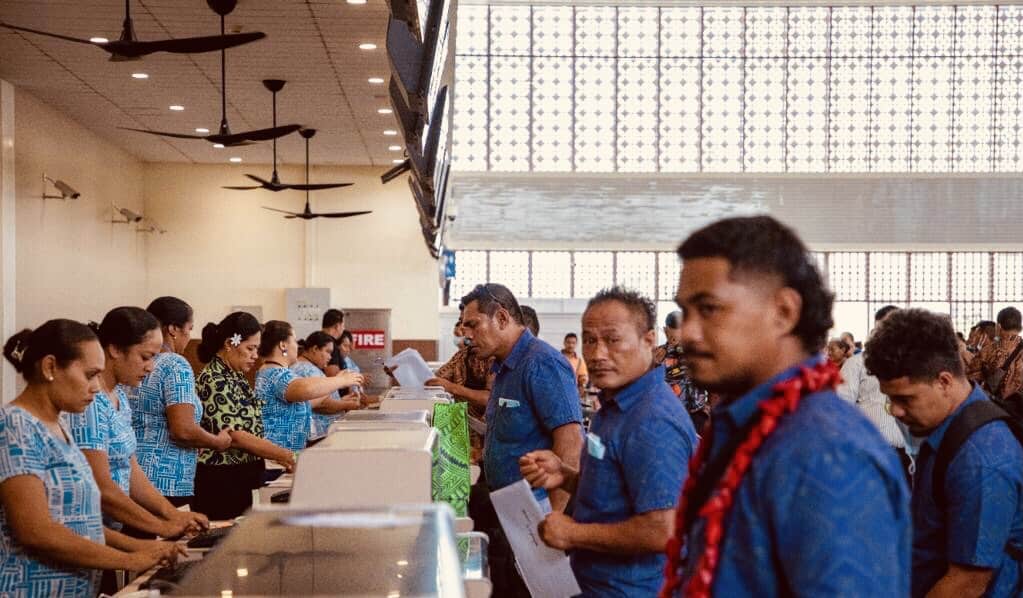New Zealand cabinet ministers have considered, but dismissed for now, a Pacific proposal for easier movement of people around the region.
Pacific Islanders are subject to tougher entry conditions when they try to visit Australia or NZ than Australians or New Zealanders face when travelling to the Pacific.
The imbalance rankles many in the region, with Pacific leaders openly calling for Australia and NZ to address the disparity.
Last month, Fiji Deputy Prime Minister, Biman Prasad, demanded as much in a rousing keynote speech at an ANU conference.
“Our people should be able to move back and forth between all our countries,” he said.
“They will build their careers across these countries.
“Our businesses should be able to easily expand across the whole region.”
Prasad said a unified, Pacific-wide single market “must include Australia and New Zealand”.
“A starting point for that must be visa-free travel between Australia and New Zealand and Pacific Island states,” he said.
Samoan Prime Minister, Fiame Naomi Mata’afa, has made a similar call, arguing on a recent visit to Australia for a European Union-style arrangement.
“We’ve been talking about that in the Pacific for a long time and part of that common market is free access of people around the region,” she said.
Mata’afa said trans-Tasman leaders have been cold on the idea, with both Australian and NZ representatives reluctant to make the change.
New Zealand Deputy Prime Minister, Carmel Sepuloni, said recent reforms to NZ’s immigration system meant steps towards a new regime were currently impossible.
“I came back and I said to our minister for immigration ‘this is something that the Pacific wants us to look at’,” she told AAP.
“The big issue for immigration at the moment is there is so much on that work programme so to try and add anything to even explore right now is not an option.
“Does that mean that it has to be off the table forever? No.
“It’s just something that can’t be on the table right now.”
While in Australia, Mata’afa said Sepuloni told her visa-free travel would lead to an exodus from the Pacific to Australia and NZ, a retort that appeared to offend the Samoan leader.
Sepuloni said the pair shared a “warm and productive” one-on-one bilateral in Samoa recently and there was other work that could be done.
“New Zealand did instigate easier travel for officials and diplomats, and so they are able to travel more easily now,” she said.
“I’m particularly interested in things like labour mobility – two-way labour mobility.
“How do we encourage the diaspora to go back and take opportunities up in the Pacific?
“We need to do some work on that and support our Pacific countries in areas where they’ve got workforce shortages.”
New Zealand is reviewing its Pacific labour mobility schemes after suggestions it sucks talent from the Pacific and revelations of poor treatment of workers.
Australia is introducing a Pacific Engagement Visa, open to 3000 permanent residents from the Pacific each year, but the scheme has missed its 01 July start date.
New Zealand Immigration Minister, Andrew Little, said further consideration of visa-free travel would come following the 14 October election.
“There’s a lot to do in between now and the end of this parliament,” he said.
“I’m sure we’ll get to it at some point.”
The disparity in travel shows up in many visa arrangements.
Most Pacific nationals must pay $190 (US$127) for a tourist or business visa to visit Australia, which often takes a month to process.
A similar cost and wait applies to visiting NZ. Fiji, Samoa, Solomon Islands and Tonga, however, grant free visas on arrival to NZ and Australian travellers, while Papua New Guinea charges AUD$75 (US$50).
